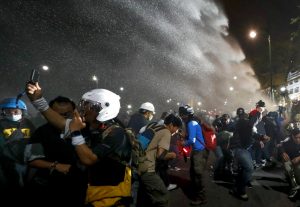The Thai authorities deployed riot police and water cannon against another large anti-government protest this weekend, as Thailand’s wet season of discontent entered a phase of attrition between protest leaders and the country’s powerful royalist-military establishment.
On the afternoon of November 8, a crowd of around 10,000 (as per Reuters’ estimate) met at Bangkok’s Democracy Monument. They then marched toward the Grand Palace, in an attempt to hand deliver to King Vajiralongkorn letters laying out their political grievances.
Discontent has been burbling in Thailand since March, during which time the country has witnessed repeated large-scale demonstrations, the imposition (and then lifting) of a special state of emergency, and scores of arrests.
The student activists leading the movement have three primary demands: the resignation of Prime Minister Prayut Chan-o-cha, a rewriting of the military-drafted constitution and – most explosively – the reform of the monarchy to bring it under constitutional control.
Risking lengthy jail terms under Thailand’s harsh lese-majeste law, protest leaders recognize the monarchy as the linchpin of Thailand’s constraining social and gender hierarchies, as well as its entrenched divides of power and wealth.
These inequalities have been cast into special relief by Vajiralongkorn, who long before his accession to the throne in 2016, attracted scorn for his lavish spending, tumultuous private life and the fact that he spends most of his time in Germany.
In this sense, the November 8 protest was deliberately provocative. Even though the king is only infrequently present at the Grand Palace, the approach to the palace represented an attempt to breach cynosure of monarchical power in order to address the king on equal terms – as a single, fallible individual.
After pushing past a thin line of police, the protesters pushed a bus that along with barbed wire had been erected to prevent marchers from approaching the palace, prompting the police briefly to fire water cannon at the crowd.
Shortly afterward, police relented and allowed protesters to place four red mock mailboxes near the palace walls, which they filled with letters and messages calling for reform.
In a statement addressed to Vajiralongkorn, activists called on the monarch to listen to “fearless criticisms,” as well as to the mellifluous flattery and praise that typically cocoons him. “It does not matter whether the people love the king or not, he must love them all the same. If the king can talk to the people who love him, he must also talk to the people who do not all the same,” read the letter.
However, while republican sentiment has begun to proliferate on social media, it remains to be seen whether this demand will attract broad support, given the genuine affection with which some Thais still view the institution of the throne.
The former opposition party leader, Thanathorn Juangroongruangkit, whose Future Forward party was disbanded after coming in third in elections in 2019, has expressed support for reforms to the monarchy, saying that the Thai people must tackle their country’s “inconvenient truth.” But other opposition parties, while offering broad support for the political movement, have leaned away from the demands pertaining to the palace. At the same time the royalist establishment has begun to mobilize its own counter-demonstrations, designed to demonstrate support for Vajiralongkorn.
At one such pro-royalist gathering on November 1, the king made a personal appearance, an indication that he is unlikely to give in to the protestors’ demands. In response to a British journalist’s question of whether there was room for compromise, Vajiralongkorn responded, “Thailand is the land of compromise.”
It is unclear what he meant by compromise, if anything. The most likely approach is that the monarchy and military will simply try to wait out the protest movement, hoping that it loses momentum in the weeks and months to come. Such are the benefits of incumbency. But student protesters have shown a degree of resolve that looks unlikely, given the dire state of the Thai economy due to COVID-19. With both sides resolved, Thailand’s season of discontent looks set to be a long one.

































